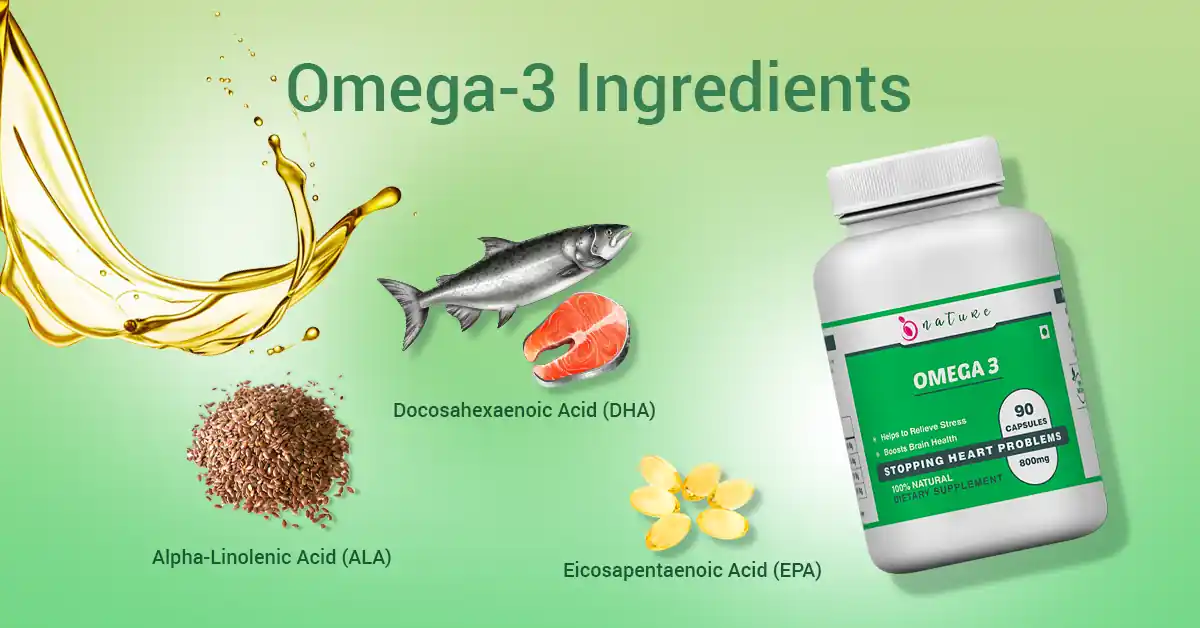In the realm of nutritional supplements, few omega 3 ingredients have garnered as much attention and acclaim as omega-3 fatty acids. These essential nutrients are celebrated for their wide-ranging health benefits, and they are found in various forms, often referred to as “omega-3 ingredients.” In this comprehensive guide, we’ll explore the world of omega-3 ingredients, delving into their sources, health advantages, and the best ways to incorporate them into your diet. (Eratte, D., Dowling, K., Barrow, C.J. and Adhikari, B., 2018.)
Omega 3 Ingredients: What Are They?
Omega 3 ingredients are a group of polyunsaturated fatty acids that play a crucial role in maintaining optimal health. The most well-known members of this group are eicosapentaenoic acid (EPA), docosahexaenoic acid (DHA), and alpha-linolenic acid (ALA). These fatty acids are considered essential because the human body cannot produce them on its own, necessitating their intake through diet or supplementation. (McKenney, J.M. and Sica, D., 2007.)
Omega 3 Fish Oil: A Rich Source of Essential Fatty Acids
One of the most popular and potent sources of omega 3 ingredients is fish oil. Fish oil is obtained from the tissues of fatty, cold-water fish such as salmon, mackerel, herring, and sardines. It is highly regarded for its high concentrations of EPA and DHA, the two most beneficial omega-3 fatty acids. (Panse, M.L. and Phalke, S.D., 2016.)
The Benefits of Omega-3 Fish Oil
Cardiovascular Health: Omega-3 fish oil has long been associated with heart health. It can reduce triglyceride levels, lower blood pressure, and improve overall heart function. These effects contribute to a decreased risk of heart disease.
Brain Function: EPA and DHA are critical components of brain cell membranes. They support cognitive function, improve mood, and may even reduce the risk of neurodegenerative diseases such as Alzheimer’s.
Inflammation: Omega-3 fish oil has potent anti-inflammatory properties. It can help alleviate symptoms of chronic inflammatory conditions like rheumatoid arthritis, asthma, and inflammatory bowel disease.
Eye Health: DHA, one of the primary components of omega-3 fish oil, is concentrated in the retina. A sufficient intake of DHA may help maintain good vision and reduce the risk of age-related macular degeneration.
Skin Health: Omega-3 fatty acids are known to support skin health by maintaining its moisture and reducing the risk of skin disorders like eczema.
Omega 3 Vitamins: The Role of Supplements
While omega-3-rich foods are an excellent source of these essential fatty acids, many people turn to supplements to ensure they are getting an adequate daily dose of omega-3 ingredients.
Types of Omega-3 Supplements
Fish Oil Capsules: These are one of the most popular omega-3 supplements. They contain concentrated amounts of EPA and DHA, making it easy to meet your daily omega-3 needs.
Krill Oil: Krill oil is another marine-based source of omega 3 ingredients, containing EPA and DHA. Some people prefer it over fish oil due to its potential for better absorption.
Algal Oil: This is a plant-based source of omega-3s, primarily DHA. It’s a great option for vegetarians and vegans who don’t consume fish products.
Flaxseed Oil: Flaxseed oil is a plant-based source of ALA, which the body can convert into EPA and DHA, although the conversion rate is limited.
Cod Liver Oil: Cod liver oil is rich in both omega-3 fatty acids and vitamins A and D, making it a popular choice for those looking to boost their nutrient intake.
Dosage and Considerations
The appropriate dosage of omega 3 vitamins or supplements varies from person to person, depending on factors like age, sex, and health conditions. It’s essential to consult with a healthcare professional to determine the right amount for your specific needs. While omega-3 supplements offer numerous health benefits, they should be used as part of a balanced diet, not as a replacement for whole foods rich in omega-3s.
Best Omega-3-Rich Foods: A Natural Approach to Health
Incorporating omega-3-rich foods into your diet is not only a delicious but also a highly effective way to ensure you’re reaping the benefits of these essential fatty acids. Here are probably the best normal sources:
1. Fatty Fish
Fatty fish like salmon, mackerel, trout, sardines, and herring are exceptional sources of EPA and DHA. They are not only delicious but also offer a concentrated dose of omega 3 ingredients. Baked or grilled, these fish make for a tasty and nutritious meal.
2. Chia Seeds
Chia seeds are a plant-based source of omega 3 ingredients, particularly ALA. They can be sprinkled on cereal, yogurt, or integrated into smoothies. Chia pudding is also a popular choice for those seeking a delightful omega-3-rich dessert.
3. Flaxseeds
Flaxseeds are another plant-based source of omega 3 ingredients, particularly ALA. You can grind them and add the powder to various dishes, such as oatmeal, soups, or smoothies. They provide a subtle, nutty flavor and a nutritional boost.
4. Walnuts
Walnuts are not only delicious but also packed with omega 3 ingredients, particularly ALA. They can be eaten on their own as a snack or added to salads, oatmeal, or baked goods for a delightful crunch and a dose of heart-healthy fats.
5. Hemp Seeds
Hemp seeds are an excellent source of both protein and omega 3 ingredients, particularly ALA. They can be sprinkled on salads, blended into smoothies, or even used to make hemp milk.
6. Seaweed and Algae
For vegetarians and vegans, seaweed and algae are fantastic sources of omega-3s, specifically DHA. They can be used in various dishes, including sushi rolls and salads, or taken in supplement form.
7. Grass-Fed Meat
Meat from animals raised on a grass-fed diet tends to have higher omega 3 content than conventionally raised meat. Opt for grass-fed beef or lamb to enjoy the benefits of these fatty acids
Omega-3 Ingredients and Heart Health
One of the primary reasons omega 3 ingredients, particularly EPA and DHA, have gained widespread recognition is their positive impact on heart health. Cardiovascular diseases, including heart attacks and strokes, are a leading cause of death worldwide. Fortunately, omega-3 fatty acids have demonstrated the potential to mitigate several risk factors associated with heart disease.
Lowering Triglyceride Levels: High levels of triglycerides in the blood are a risk factor for heart disease. Omega-3 fish oil has been shown to reduce triglyceride levels significantly.
Reducing Blood Pressure: Hypertension, or high blood pressure, is a well-known risk factor for heart disease. Omega 3 ingredients can help lower blood pressure, contributing to overall cardiovascular health.
Preventing Plaque Buildup: Omega-3s can prevent the buildup of arterial plaque, reducing the risk of atherosclerosis and related heart issues.
Improving Cholesterol Profiles: Omega-3s can raise high-density lipoprotein (HDL) cholesterol, often referred to as “good” cholesterol. This contributes to better cholesterol profiles and reduced heart disease risk.
Mitigating Impacts: Persistent irritation is a critical driver of coronary illness.
Maintaining Heart Rhythm: Omega-3s can help regulate heart rhythm, reducing the risk of arrhythmias, which can be life-threatening.
Omega-3 Ingredients and Brain Health
Omega-3 fatty acids play a significant role in maintaining optimal brain function. The human brain is primarily composed of fat, and DHA, one of the key omega 3 ingredients, is a major component of brain cell membranes. Here are some ways in which omega-3s benefit brain health:
Cognitive Function: Omega-3s support cognitive function, including memory, problem-solving, and attention. Regular intake may help maintain mental clarity, particularly in older adults.
Mood and Mental Health: There is evidence to suggest that omega-3s can have a positive impact on mood and mental health. They may reduce the risk of depression and anxiety disorders.
Brain Development in Children: Omega-3s are crucial for the development of the fetal brain during pregnancy and continue to be important for a child’s brain development throughout childhood.
Reduced Risk of Neurodegenerative Diseases: Some studies have indicated that omega-3s might help lower the risk of neurodegenerative diseases such as Alzheimer’s and Parkinson’s.
Omega 3 Ingredients and Inflammation
Persistent irritation is at the foundation of numerous medical conditions, from joint pain to disease. Omega 3 ingredients are renowned for their anti-inflammatory properties, which can alleviate symptoms and contribute to overall well-being.
Rheumatoid Arthritis: Omega-3 fish oil has been shown to reduce the symptoms of rheumatoid arthritis, an autoimmune condition characterized by joint inflammation and pain.
Asthma: Some studies suggest that omega-3s may help reduce inflammation in the airways, potentially providing relief for individuals with asthma.
Provocative Entrail Sickness: Fiery inside infection, including Crohn’s illness and ulcerative colitis, includes ongoing irritation of the intestinal system. Omega-3s may help manage symptoms and reduce inflammation.
Skin Conditions: Omega-3s can support skin health by maintaining moisture levels and alleviating symptoms of skin disorders like eczema.
Periodontal Disease: Omega-3s may have a positive impact on gum health by reducing inflammation and preventing periodontal disease.
Omega 3 Ingredients and Eye Health
Maintaining good vision and eye health is a concern for many, especially as we age. DHA, one of the primary omega 3 ingredients, is found in high concentrations in the retina. Here’s how omega-3s benefit eye health:
Age-Related Macular Degeneration (AMD): AMD is a main source of vision misfortune among more seasoned grown-ups.
Dry Eye Syndrome: Omega-3s may alleviate the symptoms of dry eye syndrome, a common eye condition characterized by discomfort, itching, and blurred vision.
Retinopathy: Omega-3s may help protect against retinopathy, a condition that can affect people with diabetes and damage the blood vessels in the retina.
General Eye Health: Consuming omega-3-rich foods or supplements can help maintain overall eye health by ensuring an adequate supply of DHA, a vital component of the eye’s structural integrity.
Omega 3 Ingredients and Skin Health
Radiant, healthy skin is a sign of overall well-being, and omega 3 ingredients can play a role in maintaining skin health.
Moisture Retention: Omega-3s help the skin retain moisture, preventing dryness and maintaining a youthful appearance.
Anti-Aging Effects: By reducing inflammation and promoting collagen production, omega-3s can contribute to smoother, more youthful-looking skin.
Protection from UV Radiation: Omega-3s may provide some protection against the harmful effects of UV radiation, helping to prevent sunburn and skin damage.
Skin Disorders: Omega-3s have been explored as potential treatments for skin disorders like eczema and psoriasis, which involve inflammation and discomfort.
Wound Healing: Omega-3s may enhance the body’s natural wound-healing processes, leading to quicker recovery from injuries and surgical procedures.
The Role of Omega 3 Ingredients in Pregnancy and Early Childhood
Pregnancy and the early stages of childhood are critical periods for brain and nervous system development. Omega-3 fatty acids, particularly DHA, play a pivotal role in these processes. Here’s how omega-3s are essential during these life stages:
Fetal Brain Development: During pregnancy, the developing fetal brain requires a consistent supply of DHA. Expectant mothers should ensure they consume enough omega-3s for the optimal growth and development of their baby’s brain.
Reduced Risk of Preterm Birth: Some studies suggest that omega-3 supplementation during pregnancy may help reduce the risk of preterm birth and its associated complications.
Early Cognitive Development: Infants and young children also benefit from omega-3s. Adequate intake during these formative years can support cognitive development, including improved problem-solving and language skills.
Reduced Risk of Allergies: Omega-3s may help reduce the risk of allergies in children, including allergies to common allergens like pollen and dust mites.
Attention and Behavioral Issues: Some research indicates that omega-3s may reduce the risk of attention and behavioral issues in children, including attention deficit hyperactivity disorder (ADHD).
The Best Omega 3 Supplements: Making Informed Choices
When considering omega 3 supplements, it’s essential to make informed choices to maximize the potential omega 3 ingredients health benefits. Here are some factors to consider:
Purity: Choose high-quality supplements from reputable manufacturers to ensure that they are free from contaminants like heavy metals and toxins.
Concentration: Look for supplements with a high concentration of EPA and DHA, as these are the omega-3 fatty acids associated with most health benefits.
Form: Consider your dietary restrictions and preferences when choosing a supplement form. Options include fish oil capsules, krill oil, algal oil, and flaxseed oil.
Dosage: Consult with a healthcare professional to determine the appropriate dosage for your specific health needs. Dosage may vary based on age, sex, and health conditions.
Likely Communications: Know about possible connections with different meds or enhancements you might take. Omega-3 supplements can interact with blood thinners and some other drugs.
Sustainability: Consider the sustainability of your omega-3 source. Look for products that are certified by organizations like the Marine Stewardship Council (MSC) to ensure responsible fishing practices.
Freshness: Omega-3 supplements can become rancid over time, losing their efficacy and developing a fishy odor. Check for expiration dates and store your supplements in a cool, dark place.
Conclusion
Omega 3 ingredients, found in various forms, from fish oil to plant-based sources, are undeniably powerful contributors to our overall health and well-being. Whether you’re seeking to support your heart, brain, skin, or other aspects of your health, the inclusion of omega-3-rich foods and, when necessary, supplements, can have a transformative impact.
The versatility and variety of omega-3 sources make it easy for individuals to tailor their approach to their specific dietary preferences and health needs. By understanding the benefits of omega 3 ingredients and making informed choices about their consumption, you can unlock the potential for a healthier, happier life. Remember, it’s always a good idea to consult with a healthcare professional or registered dietitian to create a personalized plan for integrating omega 3 ingredients into your daily routine. In doing so, you can harness the power of these essential nutrients to support your journey to better health and vitality.
You can also read : Unveiling The Remarkable Health Benefits Of Omega 3





